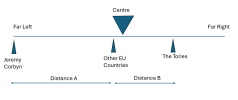Surprisingly difficult for you to understand something so simple. It’s you who doesn’t get it. Give me until after my tea and I will draw you a picture, which doubtless will help you.
As you haven't cottoned on yet and you like chatgpt(chatshite would be more appropriate, here you have these more socialist and therefore CLOSER(see dictionary definition if struggling) to a Corbyn.
If you’re asking which European countries have more “socialist” policies than the United Kingdom, the clearest comparison is through the lens of welfare state generosity, public spending, and social-democratic governance. By conventional definitions, the UK belongs to the Anglo‑Saxon liberal welfare model, which features a relatively modest welfare state compared to many continental or Nordic peers .
In contrast, countries consistently ranked as more social-democratic—with higher social spending, more universal welfare benefits, and stronger labor‑market interventions—include:
---
Nordic (Social-Democratic) Countries
Denmark, Sweden, Norway, Finland, Iceland: These nations belong to the Nordic model, characterized by high decommodification, near‑universal benefits, and strong transfer systems funded by top-tier tax levels. Social spending in Denmark, Finland, and Sweden is about 30% of GDP or more, compared to around 20% in the UK .
Sociological research (e.g. Esping‑Andersen) classifies Denmark, Norway, and Sweden as having “high socialism”—in welfare performance, redistribution, and universalism—whereas the UK is classed as “Anglo‑Saxon” with lower redistribution and less comprehensive decommodification .
Continental (Social Market) States
Belgium, France, Germany, Netherlands, Austria, Luxembourg: These countries follow the “social market economy” model. They offer generous welfare states and significant public regulation, though typically less universal than Nordic systems. They still spend around 27% of GDP on social provision—higher than the UK's ~20% .
---
Summary Table
Welfare Model / Country Group Social Spending (% GDP) Welfare Universality & Redistribution Labour/Union Influence
Nordic countries (e.g. Denmark, Sweden, Norway, Finland) ~30%+ Very high—universal services Strong collective bargaining, social cohesion
Continental Europe (e.g. France, Belgium, Germany, Netherlands) ~27% High, though often insurance‑based Moderate to strong labor protections
United Kingdom (Anglo‑Saxon model) ~20% Limited; more targeted safety net Lower union density, more liberal labour laws
---
Key Points
1. Nordic countries are regarded as the most socially oriented in Europe—highest per capita welfare expenditure, universal services, low inequality, strong unions, and active labour-market policies .
2. Continental welfare states like France, Belgium, Germany, Netherlands offer robust social protection, generous unemployment and family benefits, and heavier regulation—more extensive than the UK but slightly below Nordic universality .
3. The UK’s system is more limited and market‑oriented: welfare spending lower, less universal decommodification, higher inequality, and a smaller role for unions or political social democracy compared to Nordic or continental peers .
---
Anecdotal and public perceptions
Reddit and public commentary often describe Sweden, Norway, and Denmark as “more socialist than the UK,” while also noting that even these are still fundamentally capitalist economies with strong private sectors .
One Reddit summary confirmed:
> “Sweden here. … more socialistic than for example USA or UK … high tax burden lowering it's rating.”
… “Nordic nations aren't socialist, but capitalist with a more expanded welfare state…”
---

Final Answer
So yes, in a policy‑based sense the following European countries are generally considered more “socialist” than the UK because of their higher social spending, stronger redistributive systems, and broader universal welfare:
Nordic states: Denmark, Sweden, Norway, Finland (often Iceland)
Key Continental welfare‑states: France, Belgium, Germany, Netherlands (and Austria, Luxembourg)
These countries offer more robust social safety nets, universal benefits, and greater decommodification of essential welfare than the UK, placing them consistently above it on most measures of “socialism” in the social-democratic or welfare-state sense.


